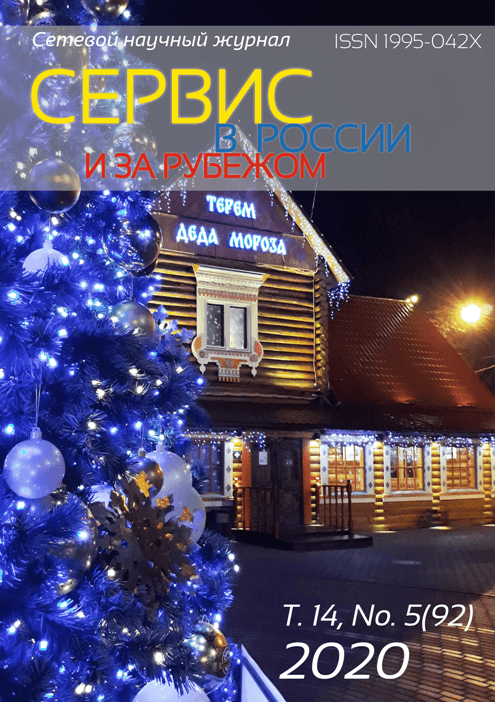Current situation and greening issues in Russian tourist accommodation sector
DOI:
https://doi.org/10.24411/1995-042X-2020-10511Keywords:
green economy, tourism industry, accommodation sector, greeningAbstract
Amid significant environmental abuses, the growth of systemic challenges to environmental safety, social needs ecological transformation, and growth of aggregate green demand, increasing pressure from national and international regulations, hotel business ecologization or greening is no longer a tendency but transforms into a crucial condition for survival and successful functioning in a highly competitive market. The article provides analysis for the Russian tourist accommodation sector development processes, as well as the place and role of the ecological component within these processes. The correlation of applied local and international accommodation classification and certification systems to dynamic changes of tourists, destinations and the local community ecological values and needs, their influence on environmental safety of tourist product manufacture and consumption are under research. It is concluded that there are no objective conditions for the green transformation of the domestic tourist industry and accommodation sector as its part. The necessity to include the goals of greening into business and tourist destination development strategies is justified. The problems, factors, and conditions of green principles entrenchment in accommodation establishments everyday activities are defined. The article aims at researching the domestic tourist industry accommodation sector development dynamics, the specification of the green accommodation sector characteristics, their transformation trends, factors, and conditions ensuring ecological requirements priorities in current and planned activities of the tourist industry accommodation sectors. The research perspectivity is determined by the necessity to extend the subject and particularities of ecological processes for a tourist product creation and consumption to develop sustainable management mechanisms for the domestic tourist industry innovative ecological modernization processes, raising its competitiveness and ensuring sustainable development of recreational and tourist regions, resorts and tourist centers.
Downloads
References
Bogdanowicz, P. (2001). European hoteliers’ environmental attitudes: Greening the business. Cornell Hotel and Restaurant Administration Quarterly, 46, 188-204.
Bondarenko, T. I., & Mishulina, S. I. (2019). “Zelenyj” spros kak faktor i uslovie ekologicheskoj modernizacii ekonomiki [Green demand as a factor and condition of the economy ecological modernization]. Vestnik Volgogradskogo gosudarstvennogo universiteta: Seriya 3. Ekonomika. Ekologiya [Journal of Volgograd State University. Economics], 21(2), 99-112. doi: 10/15688/jvolsu.3.2019.2.9. (In Russ.).
Chernovich, E., Miles, I. D., & Polyakova, V. (2015). Household Technology and the Sustainability of Consumer Behavior in Moscow. Sustainability, 8(1), 32-37. doi: 10.1089/SUS.2015.0008.
Chernovich, E., Polyakova, V. & Fursov, K. (2015). Ekopraktiki i otnoshenie rossiyan k problemam okruzhayushchej sredy. Innovacionnoe povedenie naseleniya. Monitoring. [Eco-practices and the attitude of Russians to environmental problems. Innovative behavior of the population]. Informacionnyj byulleten'. NIU VSHE [Monitoring. Newsletter National Research University – Higher School of Economics (HSE)], 2. URL: https://issek.hse.ru/data/2015/09/25/1074029049/Экопрактики-россиян.pdf (Accessed on November, 25, 2020). (In Russ.).
Dixon, S., & Clifford, A. (2007). Ecopreneurship – a new approach to managing the triple bottom line. Journal of Organizational Change Management, 20(3), 326-345.
Dukhovnaya, L. L. (2020). Sravnitel'nyj analiz ispol'zovaniya koncepcii eco-friendly v rossijskoj i zarubezhnoj praktike gostinichnogo biznesa [Eco-friendly concept in Russian and foreign hotel business practice: A comparative analysis]. Servis v Rossii i za rubezhom [Services in Russia and Abroad], 14(2), 51-62. doi: 10.24411/1995-042X-2020-10205. (In Russ.).
Flachenecker, F. (2015). Sustainability, Resource Efficiency and Competitiveness. An Assessment of Resource Efficiency Policies in the European Union. Bruges European Economic Research Papers, 32, 1-37.
Gómez Haro, S., Ferrón Vílchez, V., De la Torre Ruiz, J. M., & Delgado C. (2015). What Motivates Hotel Managers to Become Ecopreneurs: A Case Study on the Spanish Tourism Sector. Handbook of Entrepreneurship and Sustainable Development Research (Ed. Kÿro, P). Edward Elgar Publishing. doi: 10.4337/9781849808248.00020.
Koh, H. (2017). The unseen scandal of hotel food waste. URL: https://www.eco-business.com/news/the-unseen-scandal-of-hotel-food-waste/ (Accessed on November, 07, 2020).
McKeiver, C., & Gadenne, D. (2005), Environmental management systems in small and medium businesses. International Small Business Journal, 23(5), 513-537.
Mishulina, S. I. (2018). Institucional'nye, organizacionnye i ehkonomicheskie usloviya «zelenoj» transformacii industrii turizma [Institutional, Organizational and Economic Conditions for Tourism Industry “Green” Transformation]. Vestnik VolGU. Seriya 3. Ekonomika. Ekologiya [Science Journal of VolSU. Global Economic System], 20(2), 25-37. doi: https://doi.org/10.15688/jvolsu3.2018.2.3. (In Russ.).
Mishulina, S. I. (2014). Nasledie olimpiady: razvitie turistskoj infrastruktury [The legacy of the 2014 Olympics: the development of tourist infrastructure]. Sovremennye problemy servisa i turizma [Service & Tourism: Current Challenges], 4, 75-88. doi: 10.12737/6577. (In Russ.).
Mohanty, S. (2015). Hospitality Sector Staying Green for Competitive Advantage. URL: www.rsisinternational.com (Accessed on October 28, 2020).
Rao, P. (2008). Environmental initiatives undertaken by entrepreneurs in the Philippines. Journal of Entrepreneurship, 1(1), 73-81.
Rybak, O., & Rybak, E. (2016) Application of climatic indices for evaluation of regional differences in tourist attractiveness. Polythematic Online Scientific Journal of Kuban State Agrarian University, 121, 425-448. doi: 10.21515/1990-4665-121-016. (In Russ.).
Rybak, O., & Rybak, E. (2017). Evaluation of regional touristic attractiveness under conditions of changing climate. Ecology. Economy. Informatics. Series: system analysis and modeling of economic and environmental systems, 1(2), 453-461. (In Russ.).
Yusof, Y., Awang, Z., Jusoff, K., & Ibrahim, Y. (2017). The influence of green practices by nongreen hotels on customer satisfaction and loyalty in hotel and tourism industry. International Journal of Green Economics, 11(1), 1–14. doi: 10.1504/IJGE2017.10003675.
Downloads
Published
How to Cite
Issue
Section
License
Copyright (c) 2020 Mishulina, S. I.

This work is licensed under a Creative Commons Attribution-NonCommercial-ShareAlike 4.0 International License.












